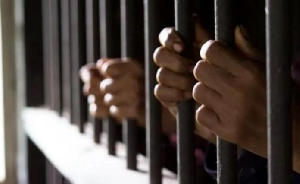The state of Ghana's tourism industry was highlighted today on the BBC. A report by BBC's correspondent Jake Kwesi Sarkodie captured the Paga Crocodile Pond and the Boabeng Fiema Monkey Sanctuary.
Tahiru Abuga tosses out a screaming live fowl over the banks of the Paga crocodile pond . A minute later five crocodiles come ashore, their jaws wide open. Six tourists look on in admiration. Tahiru has been conducting tourists around this pond, near Ghana's border with Burkina Faso, for twenty years now. He says it is always fun to persuade them to squat and touch the reptiles, or have their pictures taken with them. Amazingly, the crocodiles of Paga are harmless. Cue in (i have now touched a crocodile and it didnt bite me, they were friendly for the five minutes we were around them, this is a great day in my life, touching the tail of a crocodile alive, i Initially i was doubtful but now i have realised that the more you get near them the become friendly)
There are more than 500 crocodiles in ponds scattered across Paga, and it is taboo to harm them. Currently, the pond registers an average of 300 visitors a week. Many of them leave here impressed with how traditions and beliefs of the Paga people have helped preserve the habitat.
Cue In ( If you say they are more than 200 when people come here they don't believe until they stay here to see, we can go round and they will see them , people swim in the water, they fish there , the crocodile the migrate to other places where they feel like going, they go, especially when it rains, you see them going to people's houses , they don't do anything to them, they don't catch peoples fouls unless you give it to them , animals drink here, they do a lot of things but the crocodile don't attack them)
Tahiru hopes government will increase investment in the ponds to help the economy of the town. The Paga pond is one of many attractions that has been preserved by ancestoral beliefs. Driving seven hours from Paga, downsouth I enter a town called Buabeng Fiema. This town is home to a monkey sanctuary. Around 700 monekys, of two different species, freely interact with the local people. When a monkey dies, traditional priests hold a funeral and the body is buried at a special monkey cemetery. Tony Adasa of the Ghana wild life service tells me reverence for the monkeys is still strongly held today.
Cue In (Others have even had nasty experiences where people killed them and they also had problems for themselves, there is an intance where somebody killed a monkey and the fourtieth day he shot himself with the same gun in the same farm in the same area, Three to four years back there was one monkey that was the gyeimaa area and a Northern settler killed it, Somehow where fire came from and gutted his house , no one can tell, So people in this area are well aware of the sacred nature of the monkey so when they see them seldom do the kill them}
Over the coming years, the government wants the number of tourists to double, from the estimated half a million that visited Ghana in 2005. Tour operators however say the undeveloped nature of attractions like the Paga pond and Boabeng Fiema Monkey Sanctuary, which show off Ghana's rich cultural traditions, has impeded the growth of the industry. So before a full programme is implemented to take full advantage of these sites, Tahiru and others continue to protect and hold on to these traditions that have kept these natural resources alive.
For BBC Network Africa, this is Jake Kwesi Sarkodie, in Ghana












